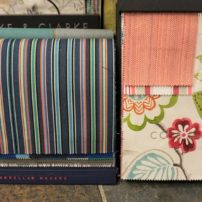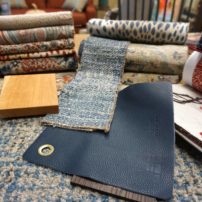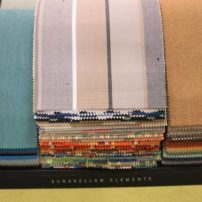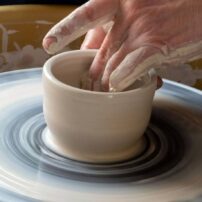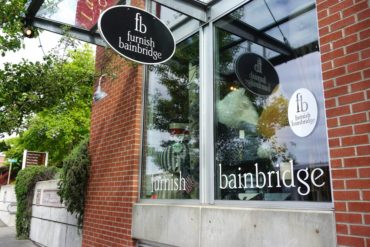 Buy American-built furniture and upholstery slipcovers to reduce your impact on global warming. Not the typical sales pitch if you’re in the market for a new sofa. However, a conversation with Bainbridge Island entrepreneur and designer Mary Terry can be very convincing. You’ll find yourself seriously considering an eco-friendly, Instagram-worthy, marine-blue sofa posing with a pile of colorful velvet, tufted floor pillows — a sofa and pillows you never knew you wanted until that moment.
Buy American-built furniture and upholstery slipcovers to reduce your impact on global warming. Not the typical sales pitch if you’re in the market for a new sofa. However, a conversation with Bainbridge Island entrepreneur and designer Mary Terry can be very convincing. You’ll find yourself seriously considering an eco-friendly, Instagram-worthy, marine-blue sofa posing with a pile of colorful velvet, tufted floor pillows — a sofa and pillows you never knew you wanted until that moment.
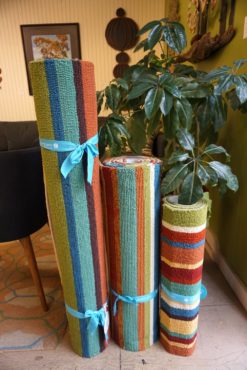 Terry is emphatic that an initial investment in high-quality, American-made furniture built by companies that support and pay their employees well — and a periodic refurbishing of that investment with new slipcovers — will reduce fossil-fuel output while keeping poor-quality furniture from being disposed of in landfills. And she should know. She’s designed and sewn over 600 slipcovers in her career as a designer/maker/seamstress.
Terry is emphatic that an initial investment in high-quality, American-made furniture built by companies that support and pay their employees well — and a periodic refurbishing of that investment with new slipcovers — will reduce fossil-fuel output while keeping poor-quality furniture from being disposed of in landfills. And she should know. She’s designed and sewn over 600 slipcovers in her career as a designer/maker/seamstress.
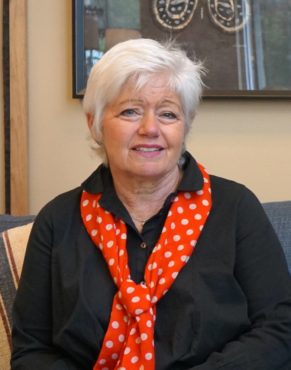
Along with Terri Bryant, her Bainbridge business partner, Terry owns three businesses on Winslow’s main street. All of them reflect the owners’ joint commitment to small-business practices that promote sustainability by showcasing local artists, doing business with wholesalers who have a commitment to environmental and worker-friendly manufacturing, and a collaboration with local women entrepreneurs.
Dana’s Showhouse was their first business partnership 14 years ago. Then in 2010, they opened Danger, joining forces with two existing businesses; and over a year later, Furnish Bainbridge became their third venture.
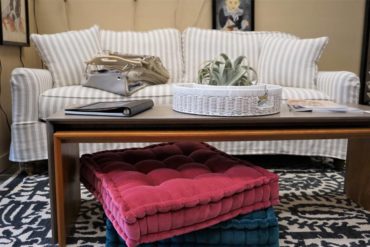 None of that was part of the plan when Terry’s family moved to Bainbridge over 40 years ago. Her in-laws, owners of the island’s sole department store, had decided to retire. Instead of taking over the family business, her husband went to work for Nordstrom and Terry, a longtime seamstress and designer, set up shop on Bainbridge doing alterations and making custom slipcovers and pillows while sourcing her local supplies at Winslow’s iconic Esther’s Fabrics.
None of that was part of the plan when Terry’s family moved to Bainbridge over 40 years ago. Her in-laws, owners of the island’s sole department store, had decided to retire. Instead of taking over the family business, her husband went to work for Nordstrom and Terry, a longtime seamstress and designer, set up shop on Bainbridge doing alterations and making custom slipcovers and pillows while sourcing her local supplies at Winslow’s iconic Esther’s Fabrics.
“I kept going in there to buy zippers,” she recalled. “And one day, I asked the women who owned the store if they’d ever consider selling it. Eventually they did and I bought the business.”
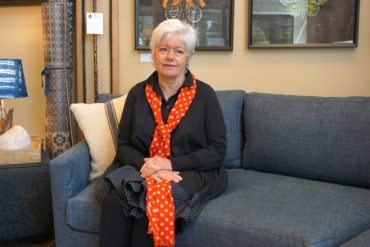 With the purchase of Esther’s, originally opened in 1959 by Esther Fox, Terry joined a lineage of Bainbridge businesswomen who have owned and operated what is now the state’s oldest continuously operating fabric store.
With the purchase of Esther’s, originally opened in 1959 by Esther Fox, Terry joined a lineage of Bainbridge businesswomen who have owned and operated what is now the state’s oldest continuously operating fabric store.
Early on, it was a chance wholesale investment in 350 yards of Marimekko fabric that made her rethink the store’s inventory and her philosophy about textiles. Marimekko is a pioneering textile company in Finland with a commitment to environmentally safe production.
“I wasn’t sure if the fabric would sell,” she said, “but people bought it.”
Realizing there was a demand for designer fabric, she began upscaling her shelves.
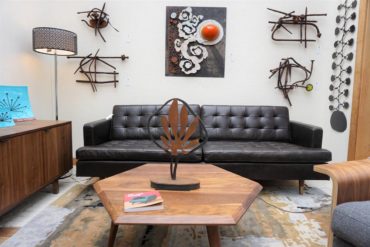 “I discovered I could build a customer base for crazy, good textiles and if I bought in bulk, I could sell the fabric at a decent price,” she said.
“I discovered I could build a customer base for crazy, good textiles and if I bought in bulk, I could sell the fabric at a decent price,” she said.
After 13 years at the helm of Esther’s, Terry decided to retire and sold the store to an employee. But retirement didn’t suit her.
“I ended up being bored out of my mind,” she said, laughing. “My kids were out of the house and you can only live so many hours in Lycra.”
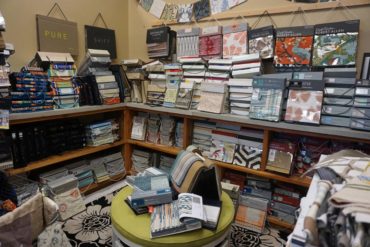 It was a conversation with friend Terri Bryant that led to their 2005 joint purchase of another iconic, women-owned, Winslow storefront, Dana’s Showhouse. A 43-year-old Bainbridge staple, it’s an eclectic home décor, paper and gift store opened by the late Dana Berg, another island environmental activist.
It was a conversation with friend Terri Bryant that led to their 2005 joint purchase of another iconic, women-owned, Winslow storefront, Dana’s Showhouse. A 43-year-old Bainbridge staple, it’s an eclectic home décor, paper and gift store opened by the late Dana Berg, another island environmental activist.
In 2010, Terry and Bryant joined forces with two existing businesses and collaboratively opened Danger, an art and jewelry gallery, home décor and furniture store featuring midcentury modern design. Danger is a vibrant shopping experience featuring bold colors and an eclectic inventory, but the focus is on local artists and personal customer service.
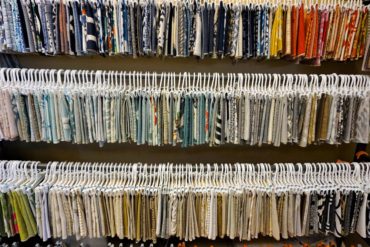 “Six years later, I saw another need,” Terry said. “I wanted to design fabric and custom furniture on Bainbridge.”
“Six years later, I saw another need,” Terry said. “I wanted to design fabric and custom furniture on Bainbridge.”
She had an expanding collection of decorator fabrics and a desire to exclusively showcase the skilled craftsmanship of the few remaining American furniture-makers constructing couches and chairs with eight-way-hand-tied coils — the upholstered furniture gold standard. The durability of their labor-intensive products mirrored Terry’s philosophy about investing in quality to reduce disposable furniture. Furnish Bainbridge was the business partners’ solution.
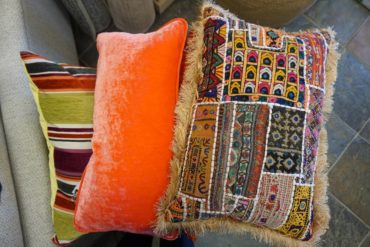 “Almost everything in this store is U.S.-produced, except the rugs, which come from India,” Terry said.
“Almost everything in this store is U.S.-produced, except the rugs, which come from India,” Terry said.
The business works with a select group of furniture builders including Miles Talbot in High Point, North Carolina; California-based Cisco Brothers and Gat Creek in West Virginia.
“I look for companies that employ very skilled furniture crafts men and women, have green business practices, can meet their deadlines and are willing to build custom pieces,” she said.
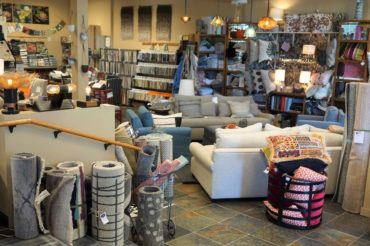 The furniture, a collection that Terry describes as “California comfortable,” draws you into the brick-front store, but it’s the textile collection that really encourages you to browse.
The furniture, a collection that Terry describes as “California comfortable,” draws you into the brick-front store, but it’s the textile collection that really encourages you to browse.
“We have the biggest library of decorator fabrics on this side of Puget Sound,” Terry said.
While she stocks mostly U.S. fabrics because she appreciates the quality-control standards used in their manufacture, an occasional unique, exotic textile can be found in her inventory — such as the pastel kilims covering upholstered benches and pillows. Sunbrella Performance Fabrics is a brand she regularly promotes.
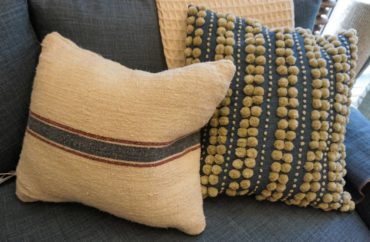 “Most people think of Sunbrella as a fabric for outdoor furniture, but it’s a perfect textile for indoor furniture and drapes,” she said. “The company manufactures its own thread in a South Carolina mill. They make solution-dyed acrylic, so the color is really in the fabric; it’s durable with no chemical residue. And they manufacture Sunbrella velvet and chenille, so there’s even more options.”
“Most people think of Sunbrella as a fabric for outdoor furniture, but it’s a perfect textile for indoor furniture and drapes,” she said. “The company manufactures its own thread in a South Carolina mill. They make solution-dyed acrylic, so the color is really in the fabric; it’s durable with no chemical residue. And they manufacture Sunbrella velvet and chenille, so there’s even more options.”
Sofas and rugs are curated with locally produced art from local woodworkers, painters and lighting designers.
“I’m still a maker,” Terry said. “I still sew. Everyone working here sews and consults on design and painting projects.”
Years in the business have honed the advice Terry gives to her customers.
“When trying to decide colors, go through your own closet. The colors you wear repeatedly are the colors that reflect who you are,” she recommends. “Make sure the furniture you purchase fits your body and is functional for your home lifestyle. Is the height of the sofa arm appropriate for your body when knitting? Is the chair wide enough for you to curl up in with a book and coffee?”
But it’s Terry’s lifetime of reinventing herself and her own recent downsize from a large, contemporary house in the woods to a beach cottage that elicits the best advice of all: “When making a major lifestyle change, bring only your art, your underwear and family heirlooms. Begin anew.”



